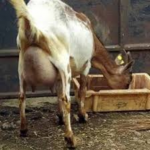Peter W
Admin
 While most farmers are more inclined towards dairy cows , Edwin has seen gold in dairy goats from his his farm in Kakamega county. The 39 year old farmer after clearing college chose to do farming , which he was passionate about since his primary school years.
While most farmers are more inclined towards dairy cows , Edwin has seen gold in dairy goats from his his farm in Kakamega county. The 39 year old farmer after clearing college chose to do farming , which he was passionate about since his primary school years."From the little capital that I managed to raise, I bought my first flock and started at our family farm at Ikolomani" Edwin recalls. "The flock is now my main source of livelihood enabling me to take care of my family needs. however, It has costed me a lot of time and energy." Edwin says. "From the financial records I have made about 1.5 million over the last 3 years. " he continues.
Edwin now has 45 goats among them 20 does which are lactating, four bucks and several juvenile goats. To earn more money, he has added a variety of goat products. He sells adult breeds between Ksh. 15,000 to about Ksh. 40,000 depending size and sex. The male ones are a reared for meat which is tender and delicious thus slightly expensive that the female ones. Other than meat and milk , Edwin sells fur and goat skin. The goat meat is Ksh. 100 more expensive than beef per kilogram unit.
It has not been challenging to market due to awareness of the health benefits of the goat meat and milk. He keeps Saanen breeds known to be from Switzerland and are best known for milk. He also rears Toggenburg and Alpine from South Africa which he bought from farmers in Vihiga County.
The 20 lactating goats produces a total of 40 litres of milk per day sold at Ksh. 200 per litre amounting to Ksh. 8,000 per day.
There is huge demand for goat milk from Kakamega which guarantees Edwin a ready market. His farm is also used as a demonstration site to train farmers who also become his customers. He has also used Facebook to grow his market territory.
Just like any other business, dairy goat farming has its challenges. The most common one being diseases such foot rot, pinkeye, mastitis and pneumonia." It is an advantage that goats are known to be resistant to diseases and weather" he says. He visits Bukura Agricultural Training College to learn on disease management skills.
"I have been able to pay my university school fees for bachelors degree in Business Administration. Even though I did my bachelors, I cannot leave the money I earn here under this tree and waste my time looking for a white collar job"
